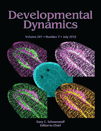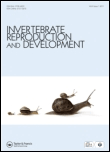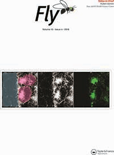
EvoDevo
Scope & Guideline
Innovating Research at the Intersection of Biology
Introduction
Aims and Scopes
- Evolutionary Developmental Biology (Evo-Devo):
The journal emphasizes the study of how developmental processes have evolved and how they contribute to the diversity of life forms. It investigates the genetic and epigenetic mechanisms that underlie developmental changes across different species. - Comparative Developmental Studies:
EvoDevo regularly publishes comparative studies that examine developmental processes across various taxa, providing insights into evolutionary relationships and mechanisms of morphological innovation. - Molecular and Genetic Mechanisms:
A significant focus is on the molecular and genetic underpinnings of development, including gene expression, regulatory networks, and the role of specific genes in developmental processes. - Ecological and Environmental Interactions:
Research often explores how ecological contexts and environmental factors influence developmental pathways and evolutionary outcomes, integrating ecological and evolutionary perspectives. - Innovative Methodologies in Developmental Biology:
The journal features studies employing cutting-edge techniques such as single-cell sequencing, transcriptomics, and advanced imaging methods to shed light on developmental processes.
Trending and Emerging
- Single-Cell Genomics and Transcriptomics:
Recent publications have increasingly utilized single-cell sequencing techniques to explore developmental processes at unprecedented resolution, highlighting the importance of cellular heterogeneity in evolution. - Non-Model Organism Studies:
There is a growing interest in studying non-traditional model organisms, such as echinoderms and various arthropods, which offer unique insights into evolutionary and developmental processes that differ from classical models. - Integration of Evo-Devo with Ecology and Evolutionary Ecology:
Research that links developmental processes with ecological factors and evolutionary dynamics is on the rise, emphasizing the interplay between development and environmental contexts. - Innovative Techniques in Developmental Biology:
The adoption of novel experimental techniques, such as hydrogel-based protocols for clearing specimens and advanced imaging methods, is becoming more prevalent, enhancing the ability to study complex developmental patterns. - Focus on Regeneration and Developmental Plasticity:
Studies examining regeneration mechanisms and developmental plasticity are emerging as significant themes, reflecting a broader interest in understanding how organisms adapt developmentally to their environments.
Declining or Waning
- Focus on Classical Model Organisms:
There has been a noticeable decrease in studies centered around traditional model organisms like Drosophila and mouse models, as newer systems and approaches gain traction in understanding developmental biology. - Morphological Studies without Molecular Insights:
Research that solely emphasizes morphological descriptions without integrating molecular or genetic analyses has become less common, indicating a shift towards more comprehensive approaches that combine both aspects. - Historical and Fossil-Based Developmental Studies:
While historical perspectives on development and fossils provided foundational insights, recent publications show a decline in this focus, possibly as the field moves towards more experimental and comparative methodologies. - Single-Taxon Studies:
There appears to be a decline in studies focusing on a single taxon without broader comparative analyses, as the journal increasingly favors works that draw connections across multiple taxa.
Similar Journals

MOLECULAR REPRODUCTION AND DEVELOPMENT
Innovating methodologies to illuminate molecular mechanisms.MOLECULAR REPRODUCTION AND DEVELOPMENT is a prestigious peer-reviewed journal published by WILEY, specializing in the intricate domains of Cell Biology, Developmental Biology, and Genetics. Since its inception in 1988, this journal has been a vital platform for disseminating pioneering research and innovative methodologies that advance our understanding of molecular mechanisms driving reproduction and development. With a current impact factor reflective of its significance in the field, MOLECULAR REPRODUCTION AND DEVELOPMENT is ranked Q3 in both Cell Biology and Developmental Biology, and Q2 in Genetics, underscoring its relevance and scholarly contribution. Catering to a diverse audience of researchers, professionals, and students, this journal not only showcases cutting-edge findings but also aims to foster interdisciplinary exchanges that enhance scientific collaboration. By exploring critical biological processes, it ultimately contributes to the broader understanding of health and disease in various organisms, making it an essential resource for anyone dedicated to the life sciences.

Journal of Developmental Biology
Pioneering Research in Developmental BiologyJournal of Developmental Biology, published by MDPI, is an esteemed open access journal that has been contributing to the field since its inception in 2013. With a focus on developmental processes across various biological systems, this journal serves as a vital platform for disseminating cutting-edge research and fostering dialogue among experts in the fields of Cell Biology, Developmental Biology, and Molecular Biology. The journal currently holds a commendable Q2 ranking in both Developmental Biology and Molecular Biology, underscoring its significance in advancing knowledge within these domains. Operating out of Switzerland, and featuring an engaging array of articles, the journal prioritizes accessibility through its Open Access model, further expanding the reach of vital research findings. Whether you are a seasoned researcher or an enthusiastic student, the Journal of Developmental Biology provides an essential resource for the latest insights and developments in this rapidly evolving field.

DEVELOPMENTAL DYNAMICS
Fostering Collaboration in Developmental ResearchDEVELOPMENTAL DYNAMICS is a prominent journal in the field of Developmental Biology, published by WILEY. This esteemed journal, identifiable by its ISSN 1058-8388 and E-ISSN 1097-0177, provides a critical platform for the dissemination of innovative research covering cellular and developmental processes across diverse biological systems. With a 2023 impact factor placing it in the Q2 category of Developmental Biology and an impressive Scopus rank of #39/82, the journal plays a vital role in advancing knowledge and fostering collaboration among researchers, professionals, and students. Although it is not an open-access publication, DEVELOPMENTAL DYNAMICS remains a cornerstone in the academic community, particularly for those dedicated to understanding the complexities of biological development. The journal's convergence from 1992 to 2024 reflects its longstanding commitment to high-impact research that influences both theoretical and practical applications in the field.

INVERTEBRATE REPRODUCTION & DEVELOPMENT
Bridging Research and Application in Invertebrate Studies.INVERTEBRATE REPRODUCTION & DEVELOPMENT, published by Taylor & Francis Ltd, is a pivotal journal in the fields of Animal Science and Zoology, with a significant focus on the reproductive and developmental processes of invertebrates. Established in 1989 and running through 2024, this journal has become an essential resource for researchers, professionals, and students interested in the intricacies of invertebrate biology. With an impressive Q2 ranking in Animal Science and Zoology and a dedicated readership, the journal explores a variety of topics including reproductive mechanisms, developmental stages, and phylogenetic aspects of invertebrates. While currently not open access, the journal provides robust scholarly content that contributes to advancing knowledge in both basic and applied biological sciences. The Scopus rankings further underscore its relevance, particularly in the domains of developmental biology and genetics, making it a noteworthy publication for those engaged in this dynamic field of research.

NATURE REVIEWS GENETICS
Transforming Knowledge into Genetic Understanding.NATURE REVIEWS GENETICS, published by NATURE PORTFOLIO, stands as a leading journal in the field of genetics, boasting a remarkable reputation reflected in its Q1 ranking across multiple categories including Genetics, Clinical Genetics, and Molecular Biology. With an impressive percentile of 99th in both Genetics and Clinical Genetics, as well as a solid rank in Molecular Biology, this journal is pivotal for researchers, professionals, and students alike who seek to stay informed on the latest advancements and comprehensive reviews in genetic research. The journal's scope encompasses a wide array of topics, providing in-depth insights from fundamental genetic principles to clinical applications, underscoring its importance in bridging basic science and medical practice. Though not an open-access publication, it remains accessible through various academic institutions, enhancing its reach and influence within the scientific community. With publication years spanning from 2000 to 2024, NATURE REVIEWS GENETICS continues to shape the future of genetics research and education.

FLY
Connecting Researchers to Transformative Insect ScienceFLY, an esteemed journal published by Taylor & Francis Inc, is a leading resource in the field of Insect Science, offering cutting-edge research and insights into the biology, ecology, and management of flies and related insect species. With an impressive Impact Factor reflecting its high citation and publication standards, FLY serves as a vital platform for researchers and practitioners aiming to advance their understanding of this diverse and crucial group of organisms. The journal, which has been publishing since 2007 and is set to continue until 2024, is recognized as a Q1 category journal in its discipline, ranked 58 out of 181 in Agricultural and Biological Sciences, placing it in the 68th percentile of the field. Although currently non-open access, the journal is committed to disseminating valuable knowledge and fostering collaboration among scientists, offering unparalleled opportunities for professionals, researchers, and students to engage with transformative science in the insect realm.

GENETICS AND MOLECULAR RESEARCH
Exploring Genetic Mechanisms for a Brighter FutureGENETICS AND MOLECULAR RESEARCH is a distinguished academic journal published by FUNPEC-EDITORA, focusing on the rapidly evolving fields of genetics and molecular biology. Since its inception in 2002, the journal has provided a platform for high-quality research and advancements that contribute to our understanding of genetic mechanisms and molecular interactions. With an impressive convergence period extending through 2024, this open-access journal presents vital insights while maintaining accessibility for researchers, professionals, and students alike. Though currently positioned in the Q4 quartile in Genetics, Medicine (Miscellaneous), and Molecular Biology as per the latest 2023 rankings, its persistent publication efforts aim to elevate its influence within the academic community. Researchers are invited to explore groundbreaking studies that may inform future developments in these critical scientific domains.

DEVELOPMENT GROWTH & DIFFERENTIATION
Fostering Innovation in Cell and Developmental BiologyDEVELOPMENT GROWTH & DIFFERENTIATION, published by Wiley, stands as a vital journal in the realms of Cell Biology, Developmental Biology, and Medicine. With an ISSN of 0012-1592 and E-ISSN of 1440-169X, this esteemed journal has been a key player in the scientific community since its inception in 1969, continuing to contribute significantly to the understanding of developmental processes and mechanisms underlying growth and differentiation. Ranked Q3 in Cell Biology and Developmental Biology, and Q2 in miscellaneous aspects of Medicine as of 2023, the journal provides a platform for high-quality research articles, reviews, and critical insights that foster academic discourse in these vital fields. Although currently not available as open access, the journal ensures the availability of essential research to its global readership, facilitating collaboration and innovation. Researchers, professionals, and students alike will find DEVELOPMENT GROWTH & DIFFERENTIATION to be an invaluable resource for advancing knowledge and driving forward the scientific inquiry into the intricacies of biological development.

Evolutionary Biology
Advancing Knowledge in Evolutionary SciencesEvolutionary Biology is a distinguished academic journal published by Springer, focusing on the intricate fields of ecology, evolution, behavior, and systematics. This journal, with the ISSN 0071-3260 and E-ISSN 1934-2845, has established itself as a critical platform for cutting-edge research and innovative ideas that shape our understanding of biological evolution and its implications. Operating from Germany, it ranks in the Q2 quartile in its category for 2023, placing it in the top tier of journals recognized for quality and impact, with a Scopus rank in the 66th percentile among its peers. Despite not being Open Access, this journal ensures comprehensive dissemination of knowledge essential for researchers, professionals, and students passionate about evolutionary studies. With a publication history tracing back to 1993 and converging years up to 2024, Evolutionary Biology continues to significantly impact the academic landscape, fostering dialogue and collaboration across various disciplines within the biological sciences.

MOLECULAR GENETICS AND GENOMICS
Unraveling the Complexities of Life at the Molecular LevelMOLECULAR GENETICS AND GENOMICS is a distinguished journal published by SPRINGER HEIDELBERG that serves as a pivotal platform for the communication of cutting-edge research and developments in the fields of genetics, molecular biology, and medicine. With an ISSN of 1617-4615 and an E-ISSN of 1617-4623, this journal has established itself since its inception in 1994 as a significant resource for researchers aiming to explore the complexities of genetic interactions and their implications in various biological systems. The journal is indexed in Scopus, with respectable rankings in the Genetics, Molecular Biology, and Biochemistry categories, showcasing its position within the academic community. It is categorized in the 2023 rankings as Q3 in Genetics, Q2 in Medicine (miscellaneous), and Q3 in Molecular Biology, indicating its relevance and quality in the scientific discourse. The journal also promotes open access, ensuring that researchers and professionals can easily share and advance knowledge in the rapidly evolving disciplines of molecular genetics and genomics. As the journal continues to bridge the gap between experimental and theoretical research, it presents a vital space for innovation, fostering collaborations and scholarly exchange among its readership.